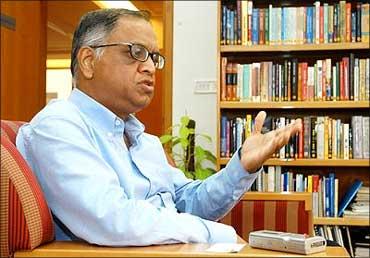
Infosys chairman and chief mentor N R Narayana Murthy shows no signs of tiring. Indeed, while most people expected him to spend a quiet life in retirement on reaching 65 next year in August, his 'second journey' with a Rs 600-crore (Rs 6 billion) venture capital fund is going to take off soon. He talks to Business Standard on Infosys' next stage of development, on the US challenge, on India's relations with China and, yes, on whether his son would join Infosys. Excerpts:
Will you look at a public role after retirement?
I was offered a position in 1999 by Atal Bihari Vajpayee, but I was not interested. First, we were taking the company to Nasdaq at that time.
Second, I don't know whether I can succeed in an environment where people are not disciplined; where people don't believe in meritocracy; and where people put their own interests above the societal interest.
One of your colleagues is doing quite well in public life.
Nandan Nilekani is an extraordinary individual, in the sense that he can get along with a wide variety of people. He is a consensus-builder and is not easily demotivated.
Click on NEXT for more...
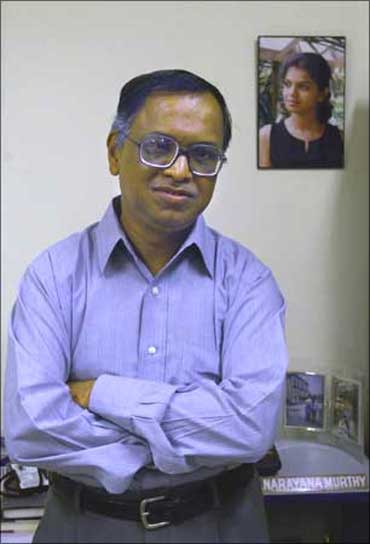
The co-founders didn't allow their family members in the company. If they are qualified, what is the harm?
There is no harm. My son is about to complete his PhD in computer sciences from Harvard University, and you can't get better than that. But, right from the beginning, we wanted to create a company that was of the professionals, for the professionals and by the professionals.
Is there a possibility of your son joining Infosys?
There is a possibility because he is highly qualified, but the probability is somewhat low. He will be finishing his studies this year, and then it's up to him to decide what he wants to do.
How have things changed in the three decades you've been in the industry?
The older generation was the victim of the Licence Raj. Of the 21 years of my CEOship, about 11 years were lost in darkness. I used to make 50 visits to Delhi for small things.
We did not have current account convertibility; we could not open offices. To import even a small thing, it required huge efforts.
Today, that has changed and the focus is on the market. The focus has shifted from meandering through the corridors of power to satisfying clients through innovation and marketing.
How is Infosys preparing itself for the next stage of growth?
We are looking at new geographies - we have started expanding in South America, Africa and Asia. We are also looking at new technologies like cloud computing, which is a big thing now.
We are looking at new models of business - for example, we are looking at transaction-based revenues.
Click on NEXT for more...
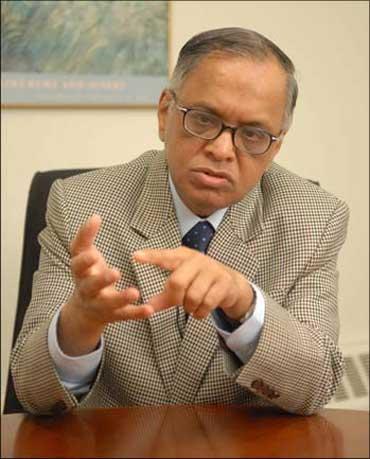
Your dependence on the US is not reducing.
In the last 10 years, we have increased the contribution from Europe - it is now a fourth of the total revenues. But the US remains the driver for most companies operating in the flat-world paradigm.
Isn't doing business with the US, the UK and other European countries becoming difficult?
There is no way any government will give up job opportunities for its citizens in favour of those from other countries. India has stopped issuing visas to the Chinese whereas they have not yet done that.
I don't think we should criticise the government because its job is to protect jobs of Indians. The US' responsibility is to protect the jobs of its citizens.
So, we need to be so innovative and so smart that these countries would say they need these people to protect the jobs of their local people.
Is India's stance on Chinese companies justifiable?
We have been able to get these opportunities because of the openness of some other countries. I can't justify closing borders here in India. I am nobody to question the government.
But Infosys grew from a zero dollar to a nearly $5 billion company based on the openness of many economies. As a child brought up in an environment of competition, an environment of openness, an environment of free movement of people, it is very very difficult for me to justify any of these.
Can China take away our jobs in the services sector?
I don't think so. As long as Indian companies bring innovation and as long as they are able to market that, India will be successful. But India will not be successful by closing its doors and sitting inside.
...
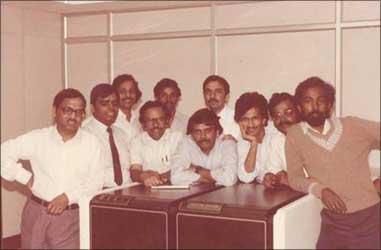
Why is Infosys so conservative about acquisitions despite sitting on huge cash reserves?
As far as we are concerned, acquisition cannot be just for a short-term benefit. It has to be strategic and it has to add value on a long-term basis.
So, you aren't concerned that Wipro or HCL will overtake you to become the number two?
Look at the data over the last 15 years - we have always done extremely well. In fact, we have reduced the gap between the number one and the number two, and will continue to do so.
You could have bettered the counter offer made by HCL for acquiring Axon?
We made an offer and the other party made a bigger offer, so it won. That is fine with us. After our finance people made their presentation and it was debated carefully, we concluded we would not go beyond our offer.
You've often said that if someone makes a hostile acquisition of Infosys, she can only acquire the infrastructure as you have the backing of employees. It appears many employees are not satisfied with the company after the new HR policy (iRACE) came into force?
No, not at all. I think if 97 per cent of the people are happy with something, it is extraordinary by any standards. Remember, we are a 113,000 people organisation.
If 2,000-3,000 of them express some dissatisfaction, it is expected ... it is understandable. But we have addressed those issues. I would not lose sleep because 2 or 3 per cent were not happy in the beginning.
...
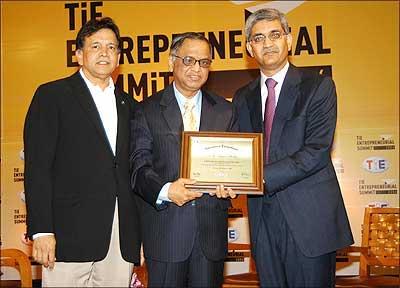
Why did you set up the venture capital (VC) fund Catamaran? The sector is very crowded already.
My view has been to see in what way I could help entrepreneurs. I became an entrepreneur in the first attempt. God was kind to us... we have created 113,000 jobs. In the second journey, I thought if I could help entrepreneurs in some way, it will be a good effort. It may succeed, it may not.
In that process, you could lose money?
By definition, VC investment has to assume that only a small percentage of investments will make returns. So, it is not an issue.
If the purpose was to help entrepreneurship, what is the rationale behind investing in SKS, which is just going for an IPO.
I think SKS is making a lot of difference to rural women ... a wonderful difference. We are quite happy with their performance.
The IPO has been criticised on the ground that SKS's promoters were trying to get rich overnight ...
That is for them to comment. All that I can say is that we invested in pre-IPO period. We think it is a good investment because it is making a difference to a lot of rural women and we are very happy.